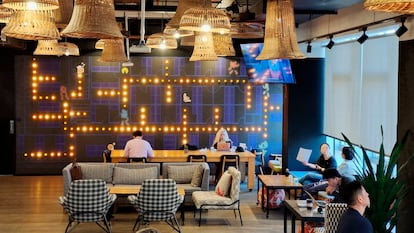WeWork: How the party ended at the company that was going to revolutionize the office
The workplace rental firm’s bankruptcy is giving investors a reality check, and prompting them to take another look at solid, credible business plans


It’s impossible to not be reminded of the lyrics of Sánchez Ferlosio when looking for lessons amidst the WeWork bankruptcy. “More bad years will come and they’ll make us more blind” / “More blind years will come and they’ll make us more bad.” The shimmering miracle of shared flexible workspace (coworking), created by 44-year-old Israeli-American entrepreneur Adam Neumann, promised to revolutionize the way companies employing thousands of workers functioned. Beer, coffee and snacks under a warm blue light. All for a monthly rent. All gone. All of it, a utopia. There are still some who defend the idea. “It allowed people to make contacts that they could learn from, or exchange resources with,” says Gretchen Spreitzer, an organizational leadership expert from the University of Michigan.
Good ideas, bad numbers. Last week, the company declared bankruptcy. In rental fees alone, with almost all of its locations in prime areas, it owes $10 billion, according to information published by The Wall Street Journal. Its main backer — Japan’s SoftBank — has lost tens of millions of dollars. Even the Wall Street giants turned out to be so very wrong on this one. In 2019, Morgan Stanley valued WeWork between $43 and $104 billion. Goldman Sachs set the bar between $61 and $96 billion, and J.P. Morgan swung between $46 and $63 billion. Outrageous numbers. And of course, at the end, there was not a single dollar in profit. Just four years later, it all sank. Here comes the Crack-Up — you can almost hear the splintering of the mast. Since its IPO in 2021 to the time its bankruptcy was announced, the company’s stock sunk 95.93%.
WeWork’s business plan was all wrong. It banked on the exponential growth of a tech company when it was in fact made from brick and mortar. But we’re not talking about a fraud on the scale of cryptocurrency platform FTX, whose founder Sam Bankman-Fried is facing a 110-year sentence, or blood testing company Theranos, whose creator Elizabeth Holmes is serving nine years and seven months in a prison in Bryan, Texas. “As disruptive as it may have seemed, WeWork is a traditional company, a plain old office rental firm. It doesn’t become tech just because it is linked to an app,” says entrepreneur Luis Cabiedes. “It’s the same as a company that delivers pizza. And the money [that flooded in] turned out not to be enough to create a competitive advantage. It doesn’t matter if you keep adding and adding capital.”
Cabiedes explains to his students this descent into Dante’s inferno. Business schools, which at one time saw the company as a role model, have changed their tune. “Any business that relies on cheap financing will not be able to overcome bear markets,” says Santiago Minguez, Esade Business School professor. “The attitude of its management team, resigned to the authority and impudence of its founder,” [The New York Times revealed business trips featuring Don Julio tequila — one of the most expensive brands on the market — in abundance, marijuana being smoked both on the job, weekend forest excursions to dance around the fire, smoke more joints and drink more tequila], “coupled with pernicious corporate governance, failed to interpret signals, such as its botched IPO in 2019.”
Ultimately, some essential concepts regarding the human condition and mathematics were violated. “You can trick people once, but not forever. Also, business models need to be profitable from the beginning,” says business angel Rodolfo Carpintier. WeWork was a lifestyle illusion that ignored a basic teaching: “The relationship between supply and demand,” says the businessman.
Post-joints, after the breakdown began, but with a $2.2 billion fortune according to Forbes, Adam Neumann disappeared from the front line of WeWork’s management back in 2019. He began to operate through his family’s business. The latest proof to come to light has been the $350 million invested by Andreessen Horowitz — one of Silicon Valley’s leading venture capital firms — in Flow, Neumann’s new real estate start-up. Now a millionaire, Neumann lives in Greenwich, New York, with his partner Rebekah and their six children.
The party’s over
It’s time to tally up what we’ve learned. Some niche trends have been overexaggerated. “How much does flexible office renting, Spain or worldwide, represent of the total market?” asks Javier Díaz, an analyst who works at the firm Bolsa Renta 4. With the price of money at 0%, there’s been a tendency to exaggerate. “One change is already visible: a higher demand for returns.” With interest rates high, and inflation continuing to spiral upward, investors are not willing to let five or more years pass without seeing benefits. The pandemic increased the popularity of working from home, negating the need for office space. “The cost-conscious have become more demanding when it comes to business plans. They have to be based on certainties and realistic criteria,” says Pablo Guijarro, a partner at International Financial Analysts (AFI). “Once again, it’s the bottom line that counts.”
This is all reminiscent of the Spain that went into debt in order to grow, and ended up, like Martinsa-Fadesa, in the largest insolvency proceedings in the country’s history. “Because tech or not, the important thing going forward it to know the real terms of rentability,” underlines Guijarro. The questions are as haunting as ghosts. “If the Saudi Arabian Public Investment Fund hadn’t been under so much pressure to invest its money, would it have supported WeWork as strongly as it did?” asks Giles Alston, senior analyst at Oxford Analytica. Another lesson to keep in mind.
The uncertain future of offices
“The story is clear. The future of work is even more radical than what WeWork could have imagined: an office-less tomorrow.” Perhaps this conclusion explains the death of a once-shining star. So says Louis R. Hyman, professor of labor relations at New York’s Cornell University. “After the pandemic, it became clear that neither employees nor the self-employed needed office space, and much less to pay for it," he says. “The façade of beer kegs and espresso machines couldn’t hide the fact that its growth was based on a very small demand for offices.” Herein lies another lesson. “Biography is the falsest of the arts,” wrote Francis Scott Fitzgerald. American journalist Walter Isaacson has taken on the task of narrating many storied lives. Albert Einstein, Benjamin Franklin, Elon Musk, Leonardo da Vinci and Steve Jobs. Isaacson once spoke of Adam Neumann, cofounder of WeWork, who he compared to Jobs and the Renaissance genius. He didn’t know that, in reality, he was buying a ticket for the Titanic.
Sign up for our weekly newsletter to get more English-language news coverage from EL PAÍS USA Edition
Tu suscripción se está usando en otro dispositivo
¿Quieres añadir otro usuario a tu suscripción?
Si continúas leyendo en este dispositivo, no se podrá leer en el otro.
FlechaTu suscripción se está usando en otro dispositivo y solo puedes acceder a EL PAÍS desde un dispositivo a la vez.
Si quieres compartir tu cuenta, cambia tu suscripción a la modalidad Premium, así podrás añadir otro usuario. Cada uno accederá con su propia cuenta de email, lo que os permitirá personalizar vuestra experiencia en EL PAÍS.
¿Tienes una suscripción de empresa? Accede aquí para contratar más cuentas.
En el caso de no saber quién está usando tu cuenta, te recomendamos cambiar tu contraseña aquí.
Si decides continuar compartiendo tu cuenta, este mensaje se mostrará en tu dispositivo y en el de la otra persona que está usando tu cuenta de forma indefinida, afectando a tu experiencia de lectura. Puedes consultar aquí los términos y condiciones de la suscripción digital.








































